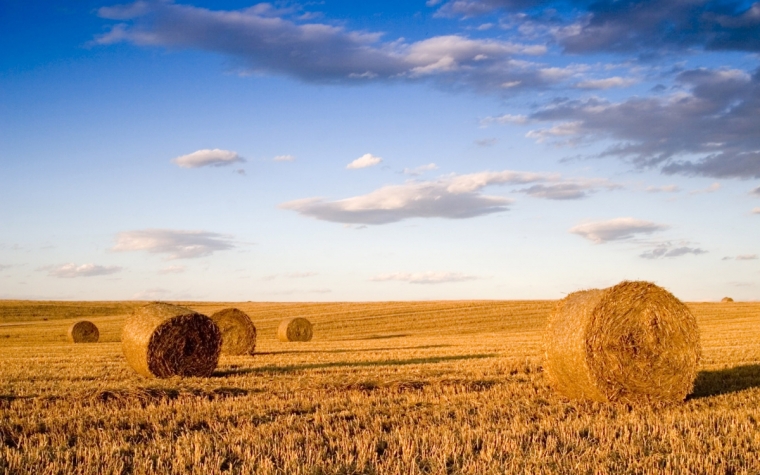'I was hungry and you fed me': The legacy of Norman Borlaug

INDIA (Christian Examiner) — In the last two weeks, I have asked more than 500 people from different walks of life in India if they knew who Norman Borlaug was.
Tragically, no one did. Yet many of them owe him their lives.
Norman Borlaug was responsible for saving a billion lives with his advances in agricultural science, such as increasing crop yields in wheat over 700 percent, and his willingness to freely spread that information around the world.
But he didn't stop there. He advised governments on economic policies to ensure not only that the food could be grown, but also that it would be available to the population.
Borlaug had humble beginnings in the prairies of Iowa. Then and as a university student in Minnesota, he witnessed the sorrows of poverty. These experiences and his Christian faith greatly shaped his heart for the poor, and he wanted to help.
Giving up a stable job at DuPont in 1944, Borlaug headed to the fields of Mexico, where he began developing high-yield, disease-resistant, highly efficient varieties of wheat—the world's largest cereal crop. By 1963, these accounted for 95 percent of wheat production in Mexico. The production was so high that Mexico began to export it.
In the early 1960s, India faced famine. The wheat cytogeneticist at the Indian Agricultural Research Institute in New Delhi, M.S. Swaminathan (whom Time magazine called one of the twenty most influential Asians of the 20th century), was aware of the developments in Mexico and wanted India to take advantage of Borlaug's work. He invited Borlaug to India.
Leon Hesser recounts in The Man Who Fed the World a story that shows what kind of man Borlaug was. Dr. Borlaug went into a meeting knowing he would have to be honest about bad government policies contributing to famine. He was so blunt with the Deputy Prime Minister of India, he feared being thrown out of the country. But that fear did not silence him. Almost miraculously, instead of throwing him out of the country, the government changed policies, and famine was averted.
Borlaug's new varieties of wheat became commercially accessible in India by 1966. The impact of these high-yielding, disease-resistant seeds was staggering. Prior to 1966, India was an importer of wheat, many millions of tons of it from the U.S. Food for Peace Program, and its production was nowhere near sufficient for its growing population. In less than 5 years, India's wheat production doubled, and it became a self-sufficient wheat-producing country.
India was not the only country to benefit. Pakistan's wheat yields rose from 4.6 million tons in 1965 to 8.4 million in 1970. Soon Borlaug's colleagues also developed high-yielding rice varieties that led to a rice revolution. Currently more than 60 million hectares are cultivated with seeds that Borlaug developed. China and parts of South America could not have fed their populations without Borlaug's seeds. Today, India and China produce enough wheat to feed their populations with leftovers for export.
Borlaug's attempt at increasing productivity depended on the use of modern agricultural technology. His methods included appropriate use of fertilizers, improved irrigation, and various means for governments to support farmers economically, including a call for competitive market rather than fixed prices.
Much to the disappointment of his critics, who opposed the use of fertilizers and genetically modified crops, Borlaug's methods gave the maximum yield in the most environmentally safe way possible. The resulting high yields meant less land needed to be cultivated, and thus less deforestation. Organic farming, with its much lower yields, would have meant clearing an unprecedented amount of forest cover to support the agricultural needs of the growing global population, and it still would not have been enough to prevent starvation for millions.
Swaminathan said of him, "Norman Borlaug is the living embodiment of the human quest for a hunger free world. His life is his message."
Borlaug's life was his message, yet he used his voice as well. "One of the greatest threats to mankind today," he said, "is that the world may be choked by an explosively pervading but well camouflaged bureaucracy."
Today this bureaucracy has embraced a worldview that undermines the importance of human life and promotes ideologies that see man as the cancer of the world. The inherent worth of human beings, as traditionally understood by modern society, is being radically reduced to suit the Malthusian principles Borlaug opposed.
But Borlaug stood up for the life of every human being, and he proved the naysayers and the proponents of forced population control wrong.
Borlaug received the Padma Vibhushan Award (India's second highest civilian award) in 2006, having received the Star of Distinction from Pakistani President Ayub Khan (1968); been named an Honorary Fellow of the India Society of Genetics and Plant Breeding (1968); received the Recognition Award of the Punjab Agricultural Research Institute (1971) and the first Honorary Memberships of the Bangladesh Botanical Society and of the Bangladesh Association for the Advancement of Science (both 1978); and at least 48 other awards from many countries whose people benefited from his work.
It was a no surprise when he won the Nobel Peace Prize in 1970. He is one of only six people ever to win that, the U.S. Congressional Gold Medal, and the U.S. Presidential Medal of Freedom. He was also a voted member of the academies of agricultural science of 11 nations, receiving 60 honorary doctorates.
Borlaug died at age 95 in 2009, but his legacy lives on in the food grains India consumes today, in the highly efficient agricultural practices that he developed, and in the billion people whose lives he saved.
We were hungry and you fed us. Thank you, Dr. Borlaug!
Vijay Jayaraj (M.S., Environmental Science, University of East Anglia, England), Research Associate for Developing Countries for the Cornwall Alliance for the Stewardship of Creation, lives in Udumalpet, India.